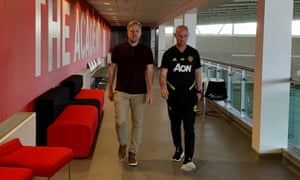Manchester United’s setup shines as seniors help locked-down youngsters | Tanya Aldred | Football
Last Friday I had a good old-fashioned nosy at Ryan Giggs’s kitchen, close enough to check out his fancy light fittings – if only virtually. Like much of the past month, it was a surreal experience, this one conjured up by the youth development team at Manchester United.
When, one Saturday morning in 2014, a man in a padded jacket slid along the touchline to hand me his number on a scrap of paper, I looked at him blankly. He said he was a scout for United and would like to get my son down to the development centre to take a closer look. I was pretty dubious – our little boy was only five.
Five and a half years later he’s still pulling on the red kit once a week, effervescent with excitement on the drive to Carrington, hidden away among the flat fields and winding lanes just off the M60. In a perverse way, from a parental point of view, we’ve been lucky; he’s had all the thrills but not reached the heady heights of the academy, where a much more intense level of commitment and sacrifice is required from all members of the family.
It has been a fascinating experience by proxy, watching a diverse selection of boys come and go, some fleetingly, others fast-tracked, and trying to work out why each one is special. What unites them is a complete devotion to the game and their football education. There must have been incidents with discipline but I’ve never seen one, and the silence as they train never stops being a surprise. In a way unusual for groups of young boys, there is a real seriousness about their purpose. They are told that they are here for a reason, show it.
United don’t over-promise. There seems to be no desire to make the kids too professional, too soon – they just let them play. They try to do cultural things, educate; recently the under-12s curated an exhibition at Carrington on Walter Tull, one of the first black footballers and the first black British officer to lead white troops – and United’s senior squad came across from their building to be shown around by the younger boys.
A few days into the lockdown, an email arrived from the academy. It was thoughtful, kind. It reminded us that parents are the biggest influence on a child and encouraged reading and a regular bedtime. It went on: “During the coming weeks we still want the boys to enjoy their childhood, explore learning for themselves, use their imagination and be creative. Some of the best learning to take place during this prolonged period of time at home will be created by the boys themselves.” It advised parents “not to force your boys to practise. Let them practise because they are in love with football”.
There has been regular contact since. They’ve sent worksheets, encouraged the boys to look after their wellbeing and made a short film of all the fitness sessions that the boys designed and sent in via WhatsApp. And then there are those hour-long Friday morning Q&A sessions, each watched by nearly 200 children. The first week they were able to question Michael Carrick; the second, Ole Gunnar Solskjær, whose Scando-Manc commitment to the academy sing-songed through each answer; then Giggs; and, on Friday, comes Marcus Rashford, a local boy who grew up on free school meals, and who in the past few weeks has helped to raise £20m for FareShare, a charity aimed at relieving food poverty.

The programme was drawn together from scratch in a few days by the academy head, Nick Cox, and his team. “The consensus was that we had to do something,” says Cox. “Football brings together people from all walks of life. Some boys will be enjoying time with their families, for other boys it will be very difficult; some will be struggling financially or health-wise, living in cramped conditions at the top of a block of flats. Some of these kids will normally be with us four or five times a week – it leaves a big hole in their lives.”
Before arriving at Old Trafford four years ago, Cox was at Watford and Sheffield United. Both have great youth setups but United is different. It is just so huge and has, in Cox’s words, “an absolute commitment to youth which surpasses all others”. Last December the club celebrated their 4,000th consecutive game with an academy player in their match-day squad, a sequence going back 82 years. Cox has had no problem persuading big names to help him with his Friday interviews: “It is what Manchester United is about – they all understand the value of the academy.”
This is just one small story about a huge club. It has nothing to do with the vats of cash swilling around at the top – though huge sums are ploughed into the academy – and everything to do with human relationships at ground level, supporting the boys and girls who are never happier than with a ball flicking, flicking, at their toes. Alongside United continuing to pay casual staff despite there being no games for them to steward, and City and United giving a joint donation to Greater Manchester food banks, it illustrates that nothing is simple; that Premier League football may be greedy and selfish, but it can also be life-enhancing and compassionate.
It is quite possible, of course, that none of those boys hanging on to Giggs’s every word as he advised young wingers, and admitted that Sir Alex Ferguson could be “a scary man”, will make it as a professional footballer. But they might remember that during a very confusing time in their lives, when their freedoms disappeared and the thing they loved best was taken away, their club didn’t forget them.
